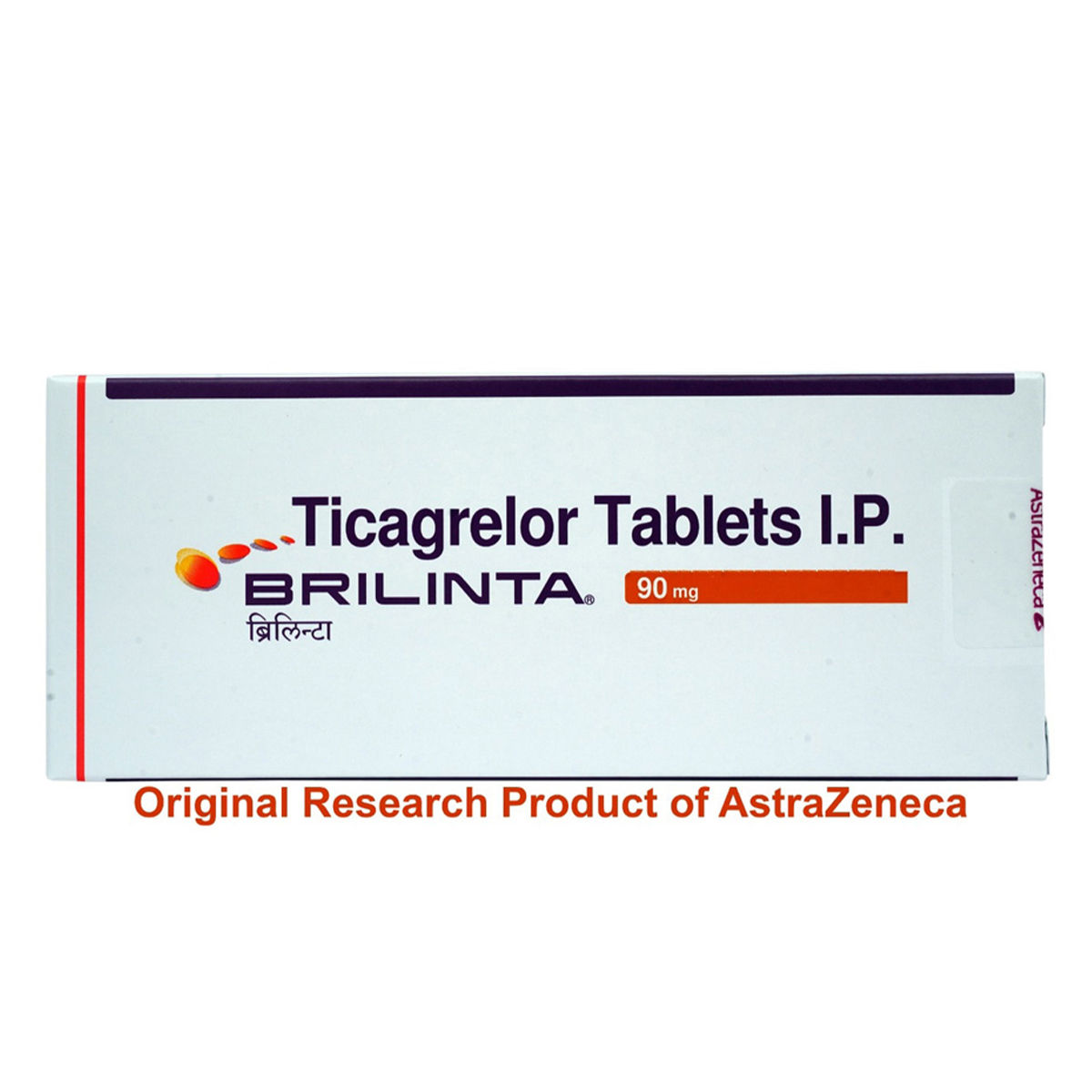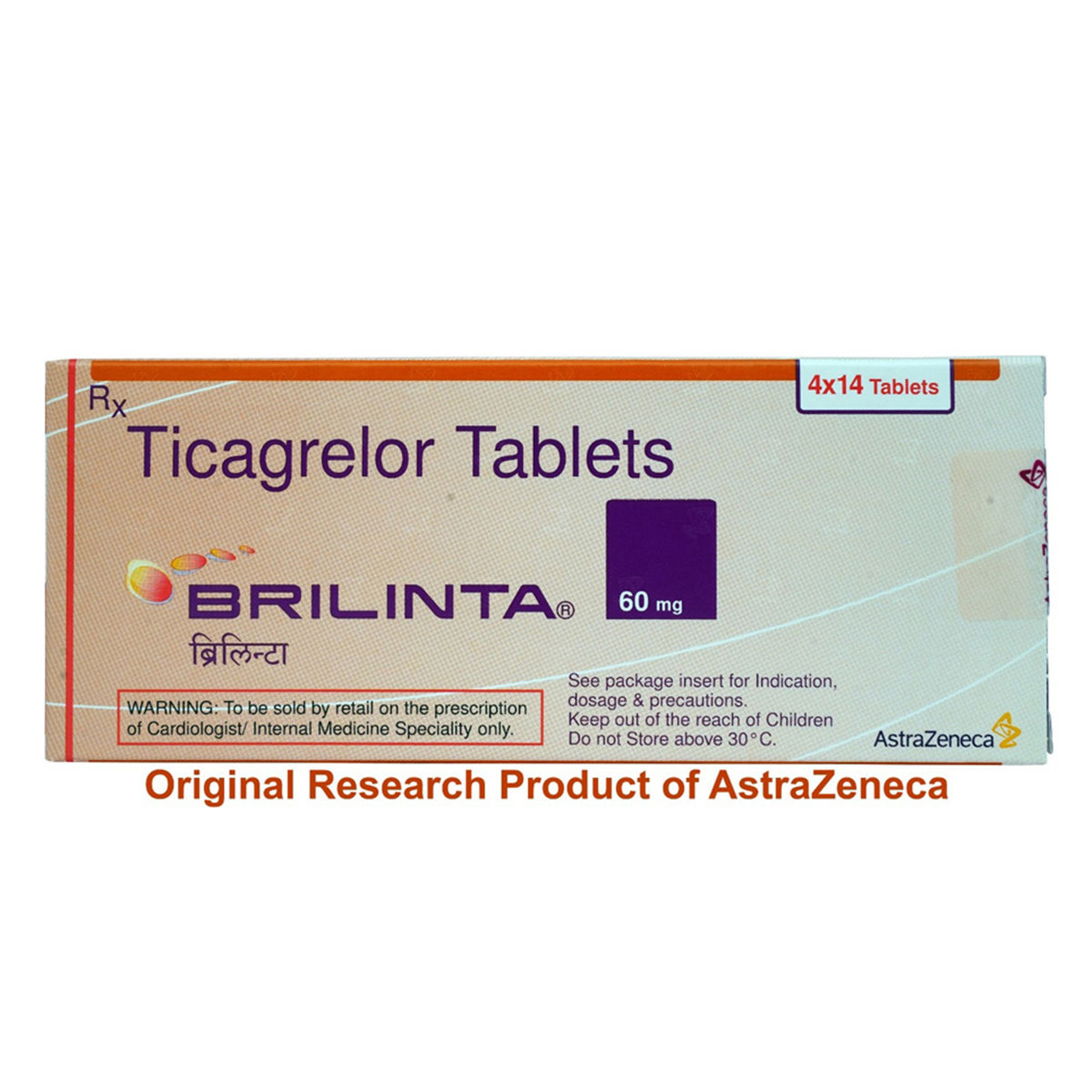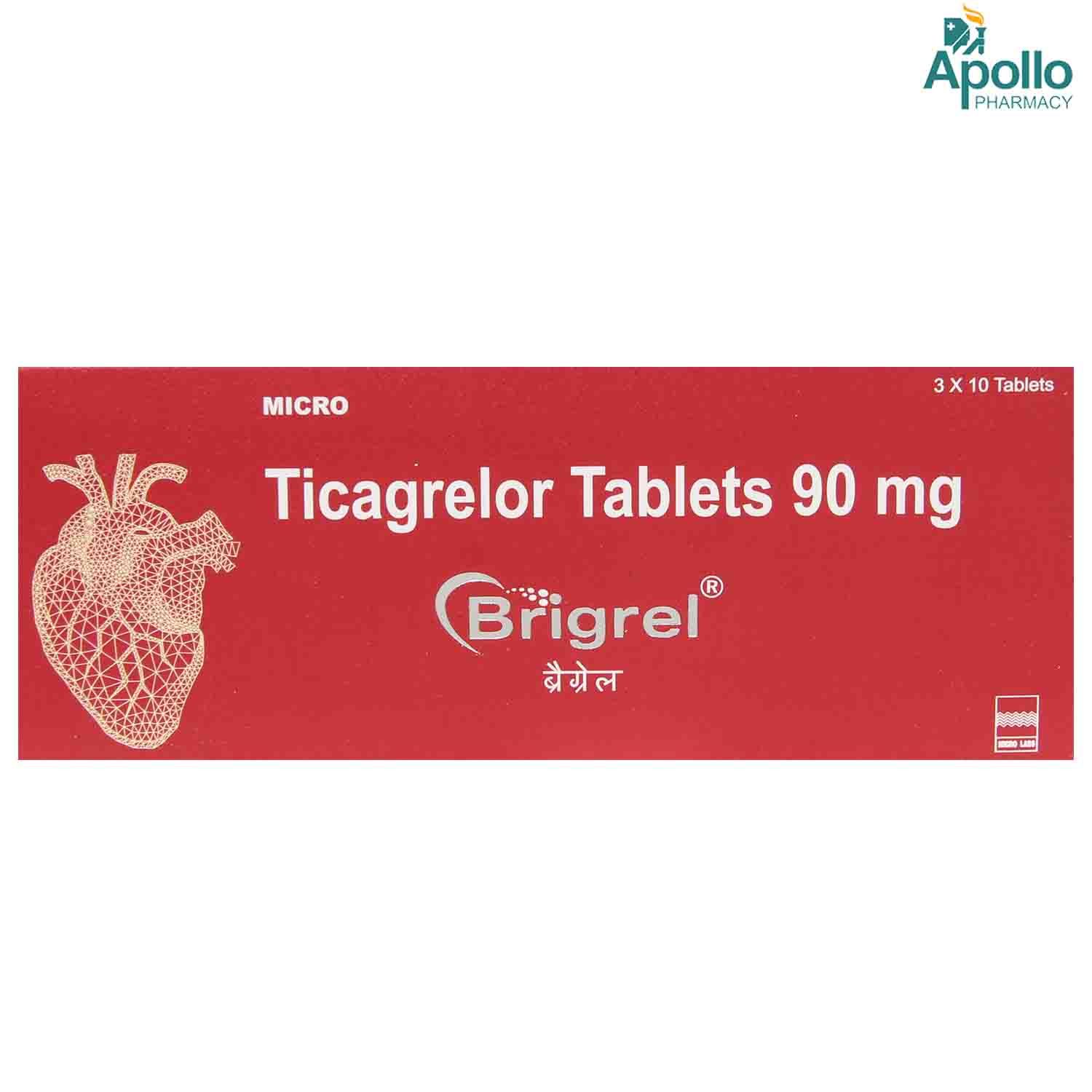Ticagrelor
About Ticagrelor
Ticagrelor belongs to the class of medications called antiplatelet drugs, primarily used to reduce the risk of heart attack or stroke in high-risk patients. It is also used to lower the risk of blood clots in people with coronary artery disease.
Ticagrelor contains Ticagrelor, which works by preventing platelets from sticking together and forming a blood clot. Thereby, Ticagrelor helps reduce the risk of heart attack or stroke.
In some cases, Ticagrelor may cause side effects like bleeding, dyspnea (shortness of breath), dizziness, nausea, and diarrhoea. If any of these side effects persist or worsen, consult your doctor.
Do not take Ticagrelor if you are allergic to any of its components. Consult your doctor if you are pregnant or breastfeeding. Keep your doctor informed about your health conditions and medications to prevent any potential interactions.
Uses of Ticagrelor
• Prevents heart attack and stroke: Helps lower the risk of future heart attacks and strokes, especially in patients with a history of heart attack or blocked arteries.
• Prevents blood clots: Lowers the formation of blood clots by preventing the platelets from sticking together.
• Enhanced effect with aspirin: Commonly used with low-dose aspirin to enhance its protective effect against clot-related events.
Medicinal Benefits
- Ticagrelor lowers the risk of heart attacks, strokes, and cardiovascular death in patients with a prior history of heart attack or who have blocked arteries.
- It helps prevent the formation of harmful blood clots, especially in patients with coronary artery disease (CAD) who have undergone stent placement.
- Ticagrelor also reduces the risk of a first heart attack or stroke in individuals with reduced blood flow to the heart (stable coronary artery disease).
- It decreases the risk of stroke and death in adults with narrowed or blocked arteries supplying blood to the brain.
- Ticagrelor is usually prescribed along with low-dose aspirin for better prevention of clot-related events.
Directions for Use
- Ticagrelor can be taken with or without food, as advised by your doctor.
- Follow your doctor's instructions on the dosage and timing of this medication.
- Swallow Ticagrelor as a whole with a glass of water.
- Do not crush, break, or chew it.
Storage
Side Effects of Ticagrelor
- Bleeding
- Dyspnea (shortness of breath)
- Dizziness
- Headache
- Diarrhoea
- Nausea
Drug Warnings
- Do not take Ticagrelor if you are allergic to any of its components or have a history of bleeding in the brain.
- Inform your doctor if you have/had bleeding problems, serious injury or surgery, stomach ulcers, colon polyps, asthma, COPD (chronic obstructive pulmonary disease), liver problems, stroke, or are due to undergo any surgery.
- Consult your doctor if you are pregnant or plan to become pregnant. Your doctor will decide if it is safe to use Ticagrelor during pregnancy or not.
- Ticagrelor is not recommended during breastfeeding as it passes into the breast milk. Your doctor will decide if you will take Ticagrelor or breastfeed.
- The safety and effectiveness in children below 18 years of age have not been established, so Ticagrelor should not be given to children.
- Seek immediate medical attention if you notice signs of bleeding, such as uncontrollable bleeding, severe bleeding, pink/red/brown urine, vomit that looks like coffee grounds, blood in vomit, red/black stools, or coughing up blood.
- Ticagrelor may cause shortness of breath. Call your doctor if you experience new or unexpected shortness of breath at rest, at night, or during any activity.
Drug Interactions
Drug-Drug Interactions: Ticagrelor may interact with medicines to thin the blood or prevent blood clots (aspirin, warfarin), pain relievers (ibuprofen), antidepressants (citalopram, nefazodone), antibiotics (clarithromycin, rifampicin), to treat HIV infection and AIDS (ritonavir, atazanavir), anti-epileptic (phenytoin, carbamazepine), medicines used to lower cholesterol (simvastatin), medicine for heart problems(digoxin).
Drug-Food Interactions: Ticagrelor interacts with grapefruit; drinking grapefruit juice while taking Ticagrelor can increase the side effects of Ticagrelor. Ticagrelor may also interact with St John's wort plant (used for depression) and Ginkgo biloba, and increase bleeding risk.
Drug-Disease Interactions: Ticagrelor should not be given to people with stomach ulcers, haemophilia (a bleeding disorder), haemorrhage (bleeding in your brain), and kidney or liver problems.
Drug-Drug Interactions Checker List:
Safety Advice

Alcohol
unsafeIt is unsafe to consume alcohol since it may worsen the side effects, such as dizziness.

Pregnancy
cautionPlease consult the doctor. There are no adequate and well-controlled studies on pregnant women. Your doctor will prescribe only if the benefits outweigh the risks.

Breast Feeding
cautionTicagrelor may pass into breast milk and may cause side effects in a breastfed child. Please consult your doctor before starting Ticagrelor.

Driving
cautionDo not drive or operate machinery if you experience dizziness or drowsiness while using Ticagrelor.

Liver
cautionLet your doctor know if you had or have any history of liver disease or hepatic impairment. Your doctor will weigh the benefits and potential risks before prescribing Ticagrelor. However, Ticagrelor is not recommended in patients with severe liver problems.

Kidney
cautionLet your doctor know if you had or have any history of kidney diseases/conditions. Your doctor will weigh the benefits and potential risks before prescribing Ticagrelor. However, Ticagrelor is not recommended in patients with severe kidney problems.

Children
unsafeTicagrelor is not recommended for children below the age of 18 years. The safety and effectiveness of Ticagrelor have not been established in children.
Habit Forming
Diet & Lifestyle Advise
- Reducing weight and having a healthy BMI are very important in enhancing cardiac health.
- 30 minutes of daily physical exercise can go a long way in preventing heart disease.
- Avoid smoking to improve cardiac health.
- Invest in a healthy, balanced diet. Avoid fatty foods, keep your cholesterol in check and load up on the green leafy vegetables, fish, lean meats, nuts and dry fruits.
- Reducing stress is crucial for maintaining a healthy heart. Try yoga and meditation for a relaxed state of mind.
Special Advise
- Avoid activities that may increase your risk of bleeding or injury. Use extra care to prevent bleeding while shaving or brushing your teeth.
- Do not stop taking Ticagrelor without consulting your doctor, as it may increase the risk of a heart attack or stroke.
- Let your doctor know if you are due to undergo any surgery or procedure.
- Do not take doses of aspirin higher than what your doctor tells you to take.
Patients Concern
Disease/Condition Glossary
Blood clot: Blood clot is an aggregation of blood that changes from a liquid to a gel-like state. Clotting is a natural process that prevents you from losing too much blood in surgery, cuts, accidents, and trauma. When a clot forms inside the veins, it won't always dissolve independently and can become an even life-threatening situation.
Heart attack: Heart attack occurs when a blood clot blocks the blood flow to the heart. This blockage of arteries is often an accumulation of fat, cholesterol, and other substances, which form a plaque in the arteries that feed the heart (coronary arteries). During a heart attack (myocardial infarction), the blood supply which nourishes the heart with oxygen is cut off. This causes the heart muscle to die. Heart attack signs include chest pain, upper body pain, sweating, nausea, fatigue, and trouble breathing.
Stroke: When our brain does not get sufficient oxygen and blood supply, it starts dying within a few minutes, leading to a heart attack or stroke.
Acute coronary syndrome: Acute coronary syndrome is most often caused by plaque rupture or clot formation in the heart's arteries. The symptoms may include heart attack-like chest pressure, chest pressure while resting or doing light activity, or sudden heart stoppage.
FAQs
Ticagrelor is primarily used to prevent heart attack or stroke in people at high risk of heart disease. It‚ helps to prevent blood clots in people with acute coronary syndrome (the heart doesn't receive enough oxygen) who have had stents placed in blood vessels in their heart.
Ticagrelor contains Ticagrelor, which works by preventing platelets from sticking together and forming a blood clot.
Yes, taking Ticagrelor can increase the risk of bleeding. So, please be very cautious while cutting fingernails or toenails, shaving, or using sharp objects to avoid bleeding.
Please consult your doctor if you are due to undergo any surgery. The doctor might ask you to stop taking Ticagrelor a few days before surgery since it can cause an increased risk of bleeding during surgery.
There might be a problem if you take herbal therapies with Ticagrelor, especially those that affect blood, like Ginkgo Biloba, Grapefruits, St John's wort plant extract used as an antidepressant. Taking these can increase your risk of bleeding. Tell your doctor if you are using any herbal supplements before taking Ticagrelor.
Ticagrelor may cause shortness of breath, making it difficult to breathe in people with asthma or COPD. Hence, it should be used with caution. Please consult your doctor if you have asthma or breathing problems.
Do not drink grapefruit juice while taking Ticagrelor. Grapefruit juice may increase the blood-thinning effect of the medicine.
Ticagrelor contains ticagrelor, which, when taken with clopidogrel, may increase the risk of bleeding. Consult the doctor before taking other medicines with Ticagrelor.
Ticagrelor should not be discontinued without a doctor's consultation. Stopping Ticagrelor might increase the risk of a heart attack or stroke.
Ticagrelor may cause blood in urine. Consult the doctor if you experience this.
Ticagrelor might lower the blood pressure. Let the doctor know if you are taking anti-hypertensives (blood pressure-lowering medicines). Regular monitoring of blood pressure levels is advised.
Ticagrelor can be taken with other medicines if prescribed by the doctor. Before starting Ticagrelor inform the doctor if you are taking any other medicines to prevent interactions.
Ticagrelor is an antiplatelet medicine which inhibits the aggregation of platelets that may cause a heart attack or stroke.
Limit alcohol consumption with Ticagrelor as it might increase the risk of bleeding.
Ticagrelor may cause significant, sometimes fatal bleeding. Inform the doctor if you have/had a condition that causes you to bleed more easily than normal; bleeding in your stomach, intestines, or brain; a stomach ulcer; polyps (abnormal growths in the lining of the large intestine); a stroke or mini-stroke; or liver disease. Seek immediate medical attention if you experience unexplained, severe, long-lasting, or uncontrollable bleeding; red or black, tarry stools; pink or brown urine; vomit that is bloody or that looks like coffee grounds; or coughing up blood or blood clots.
Ticagrelor works within 30 minutes of taking the first dose.





